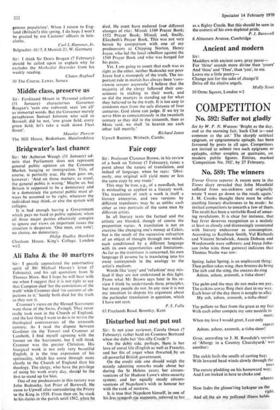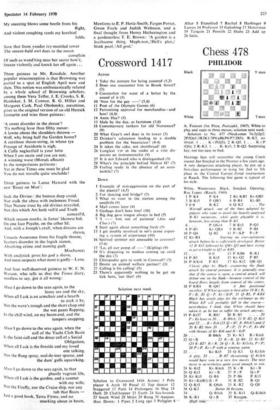COMPETITION
No. 592: Suffer not gladly
Set by W. F. N. Watson: 'Bright as the day, and as the morning fair, Such Clod is—and common as the air.' The sharply satirical epigram, or epigrammatic epitaph, has been favoured by poets in all ages. Competitors are invited to submit two such epigrams or epitaphs, either couplets or quatrains, on modern public figures. Entries, marked 'Competition No. 592', by 27 February.
No. 589: The winners
Trevor Grove reports: A recent note in the Times diary revealed that John Masefield suffered from sea-sickness and originally wrote 'I must go down to the roads again.' J. M. Crooks thought there must be other startling literary disclosures to be made: he invited competitors to unearth a few of them. The result has been a veritable flood of amaz- ing revelations. It is clear for instance, that hay fever deserves recognition as a malady at least as closely and distressingly associated with literary endeavour as consumption. According to Kathleen Smith, Val Richards and Vincent Strudwick, Austin Dobson and Wordsworth were sufferers; and Joyce John- son (who wins three guineas) indicates that Thomas Nashe was too: Spring, laden Spring, is an unpleasant thing; Then pollen takes wing, then breezes do bring The itch and the sting, the sneezes do ring Ashoo, ashoo, ar000sh, a-tisha-shoo I
The palm and the may do not make me gay, The catkins asway fling their dust in my way, Each hour of the day there is nought to allay My ash, -ashoo, ar000sh, a-tisha-shoo!
The pollens so fleet from the grass at my feet With each other compete my sore nostrils to meet; When my love I would greet, I can only repeat Ashoo, ashoo, ar000sh, a-tisha-shoo Gray, according to J. H. Rossdale's version of 'Allergy in a Country Churchyard,' was another: The sickle hails the smells of carting hay; With lowered head winds slowly through the trees The curate plodding on his homeward way; And I am locked in here to choke and wheeze.
Now fades the glimm'ring larkspur on the
right,
And fike, air ,my _pollened illness holds.
My sneezing blows some beetle from his flight, And violent coughing rends my kerchief folds.
Save that from yonder ivy-mantled tower The sneeze-bald owl does to the moon complain Of such as wand'ring near her secret bow'r, Sneeze violently and knock her off again ...
Three guineas to Lance Haward with the new 'Essay on Man': Seek the Divine: the human deep avoid, Nor stalk the abyss with inclement Freud. That Nature trust by old divines revealed, Not this which Art hath veil'd and Truth conceal'd, Which reason mocks, in Janus' likeness hid, On one face Psyche, on the other Id; And, with a Joseph's craft, when dreams are shewn, Unseats Assurance from his fragile throne, Scatters disorder in the logick stance, Absolving crime and naming guilt Mischance; With analytick gives his god a shove, And most suspects what most is godly—Love.
And four well-deserved guineas to W. F. N. Watson, who tells us that the Times diary, needless to say, lot it all wrong: Must I go down to the seas again, to the lousy sea and the sky, When all I ask is an armchair and a hearth to stick it by, Not the wave's trough and the short chop and the wet pants flapping, In the chill wind, on my beam end, and the tempers snapping.
Must I go down to the seas again, when the call of the Yacht Club Basin Is the faint call and the drear call of a Social
Obligation, When all I ask is the fireside and my loved one talking, Not the flung spray, mal-de-mer spume, and the dam' gulls squawking.
Must I go down to the seas again, to that
ghastly vagrant life, When all I ask is the garden, and a saunter with my wife;
Not the Firefly, nor the Cruise ship, nor any
tub that floats - Just a good book, Terra Firma, and no mucking about in boats. Three guineas to Mr. Rossdale. Another popular misconception is that-Browning was partial to a spot of English April now and then. This notion was enthusiastically refuted by a whole school of Browning scholars. among them Vera Telfer, J. E. Crooks, S. R. Hardaker, I. M. Connor, R. G. Hillier and Margaret Cash. Paul Obolensky, meantime, gives us the original version of an old Herrick favourite and wins three guineas: `A sweet disorder in the dresse'!
'Tis nothing lesse than filthy messe : A lawne about the shoulders thrown - Well, why bring half the Garden home?
A carelesse shooe-string, in whose tye Presage of Accidente is nigh, A Cuffe neglectful! is your lotte When I am neate and you are not; A winning wave (Morals afloate) In the tempestuous petticote: Yet in these Times one must be glad You do not travelle quite uncladde! Mentions to E. P. Heriz-Smith, Fergus Porter, Gwen Foyle and Judith Weltman, and a final thought from Henry Hetherington and a gardenerless T. E. Brown : 'A garden is a loathsome thing, Meph.wot,/ Hell's plot,/ Stink pool,/All grot.'



































 Previous page
Previous page